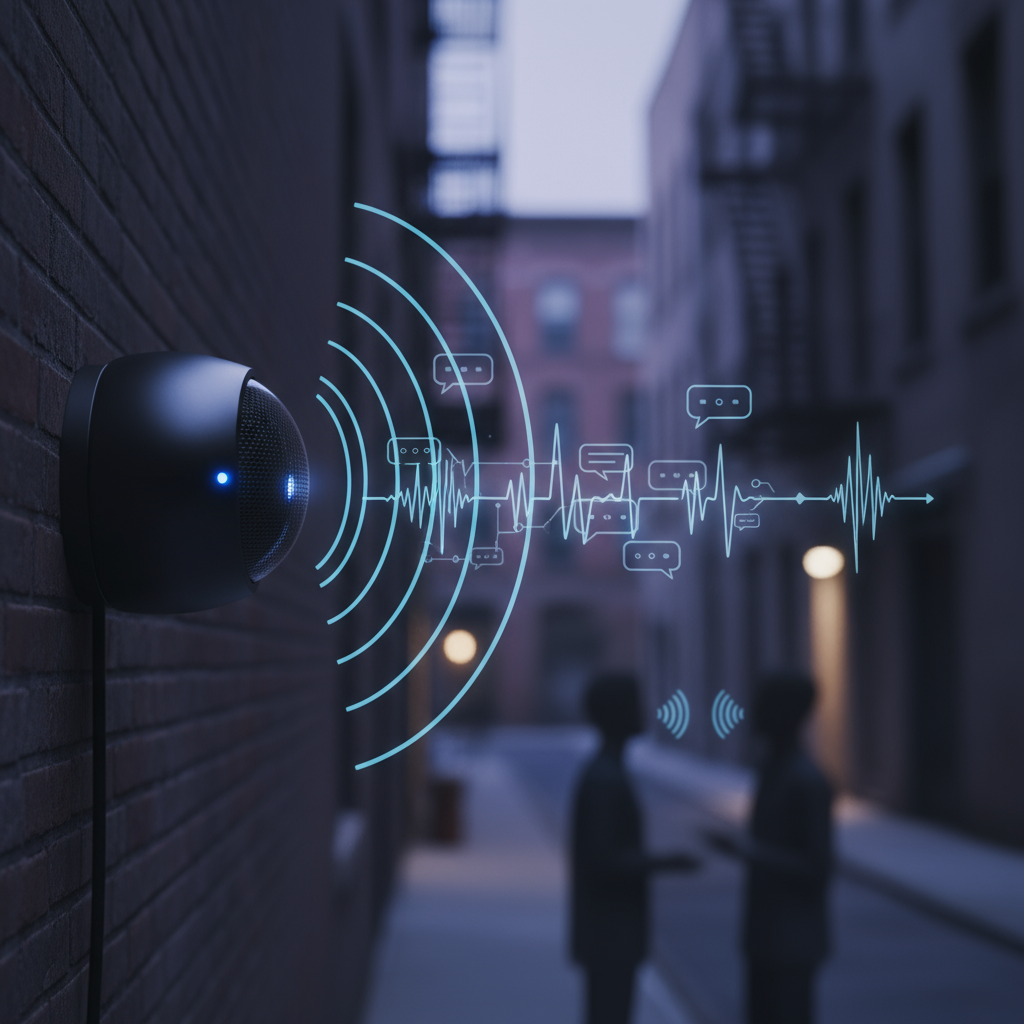Beyond the Bang: Flock’s Gunshot Detectors Are Now Eavesdropping on Conversations

Imagine a world where the very air around you, once a sanctuary for private thoughts and casual conversations, now carries the potential for constant surveillance. This isn’t a scene from a dystopian novel; it’s rapidly becoming a reality as Flock Safety, a growing name in public safety technology, announces a significant expansion of its gunshot detection microphones. While initially designed to identify the critical sound of gunfire, these devices are now being repurposed to actively listen for human voices, raising a chorus of complex questions about privacy, public safety, and the evolving landscape of surveillance in our communities.
This shift from detecting distinct, sharp sounds to potentially analyzing the nuanced patterns of human speech marks a profound transformation. What does this mean for our rights, our expectations of privacy in public spaces, and the very fabric of our social interactions? Let’s delve into the implications of this technological leap and explore the concerns it brings to the forefront.
From Gunshots to Whispers: The Expanding Scope of Audio Surveillance

Flock Safety made its name by deploying smart cameras and acoustic sensors in neighborhoods and cities, initially promising a rapid response to violent crime by pinpointing gunshots. The idea was straightforward: immediately alert law enforcement when a firearm was discharged, ideally reducing response times and saving lives. This application, while not without its own set of privacy debates, generally focused on a singular, urgent event.
However, the recent announcement indicates a substantial broadening of this mandate. These same microphones, once tasked with identifying the percussive crack of a gun, are now being configured to pick up and process human voices. The stated goal remains rooted in public safety – perhaps to detect arguments escalating into violence, or to capture evidence of other disturbances. Yet, the leap from a specific acoustic signature to the vast, complex, and deeply personal realm of human speech is monumental.
Consider the technical implications alone. Detecting a gunshot is a relatively focused acoustic task. Identifying and distinguishing human voices, let alone discerning the content or intent of conversations, requires far more sophisticated processing and opens the door to an unprecedented level of data collection. This expanded capability suggests a future where our public utterances, once ephemeral, could become digitally captured and analyzed.
The Slippery Slope of Surveillance: Privacy Concerns Explode
The immediate and most pressing concern surrounding Flock’s move to capture human voices is, undoubtedly, privacy. Public spaces, while not traditionally considered private in the same way a home is, still afford an expectation of anonymity and the freedom to converse without pervasive monitoring. This new capability fundamentally challenges that expectation.
Think about a park bench where friends are discussing personal matters, a protest where citizens are voicing dissent, or a quiet street where neighbors are having an impromptu chat. The potential for these conversations to be inadvertently or even intentionally recorded, analyzed, and stored by a private company, and potentially shared with law enforcement, is deeply unsettling.
Furthermore, the technology itself raises questions of accuracy and potential misuse. Will these systems be able to differentiate between loud, boisterous laughter and an argument? What about cultural nuances or different speech patterns? The risk of misinterpretation, false positives, and the creation of an evidentiary record based on incomplete or misunderstood audio is significant. This could lead to individuals being unfairly targeted or investigated based on snippets of conversation taken out of context.
Benevolent Intentions, Unforeseen Consequences: Balancing Safety and Liberty
Proponents of this technology will undoubtedly argue that its primary purpose is to enhance public safety by providing law enforcement with critical real-time information. They might point to scenarios where early detection of a verbal altercation could prevent a physical assault, or where recorded audio could provide crucial evidence in a criminal investigation. The desire to create safer communities is a universal and laudable goal.
However, history teaches us that innovations introduced with benevolent intentions can often have unforeseen and far-reaching consequences, particularly when they involve significant encroachments on individual liberties. The incremental expansion of surveillance capabilities, often justified by an immediate need, can collectively lead to a society where privacy becomes an illusion.
The “why” behind this expansion is critical. Is it purely for detecting escalating threats, or does it open the door to a broader analysis of public dialogue? Who has access to this data? How long is it stored? What are the protocols for its use, and are there robust independent oversight mechanisms in place to prevent abuse? These are not mere technicalities; they are fundamental questions that demand transparent and accountable answers from both the companies deploying these technologies and the municipalities adopting them.
The debate around Flock’s expanded capabilities mirrors broader discussions about AI ethics, the role of private companies in public safety, and the limits of state power in a democratic society. It forces us to confront a foundational tension between the desire for security and the fundamental right to privacy and freedom of expression.
The Road Ahead: Demanding Transparency and Accountability
As Flock’s gunshot detection microphones begin their new role of “listening” for human voices, it is imperative that communities, civil liberties organizations, and policymakers engage in a robust and informed discussion. This conversation cannot be postponed until after the technology is widely adopted; it must happen now.
We must demand transparency from companies like Flock regarding the exact capabilities of their devices, the type of audio data collected, how it is processed and analyzed, data retention policies, and who has access to this potentially sensitive information. Similarly, municipalities considering the deployment of such systems have a responsibility to educate their citizens, conduct thorough impact assessments, and establish clear, legally binding policies that safeguard privacy and prevent mission creep.
The future of public safety should not come at the expense of our fundamental rights. While technology can be a powerful tool for good, its deployment must always be guided by ethical considerations, public consent, and an unwavering commitment to protecting the very liberties it aims to secure. The silence of ignorance around these evolving surveillance technologies could be far more deafening than any conversation captured.

